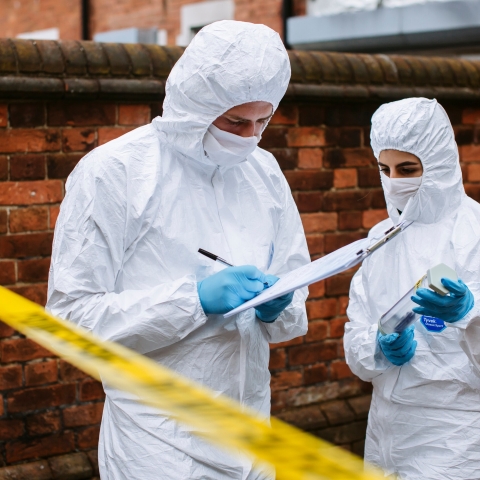
There's a wide range of occupations in criminal justice. A great place to start planning is by exploring job profiles which provide key responsibilities, skill requirements, starting salaries, entry requirements and career prospects in the various roles available.
Potential Job Roles
Job roles in this sector include:
Areas of employment
There are three key areas within the Criminal Justice sector:
- client-facing support role
- intelligence and investigation, law enforcement and custodial role
- forensic role
There are various types of employers and different sub-groups within these areas, such as youth offending, substance and addiction, criminal analysis and lab-based forensic science. You should consider which area(s) you are particularly interested.
Here you can find more details on the requirements for each area of Criminal Justice.
These roles work directly with offenders or victims, either 1-1 or in small groups. You can find positions in statutory organisations like the Probation Service and local authorities, as well as in a wide range of not-for-profit organisations.
National Probation Service (NPS)
The NPS oversees all pre-sentence reports, conducts initial risk assessments, and manages high-risk offenders.
The NPS runs a paid, Professional Qualification in Probation (PQiP), a 15-month training programme for graduates. Graduates from any degree are eligible if they have relevant experience in working with challenging behaviour and have completed four required knowledge modules available:
- Criminal Justice System
- Understanding Crime and Criminal Behaviour
- Penal Policy and the Punishment of Offenders
- Rehabilitation of Offenders
Unqualified roles, such as Probation Service Officers, are available in the NPS.
Roles in this field can be community-based or office-based, working with the public or behind the scenes, primarily in statutory organisations like the Police Force, Prison Service, Intelligence and Security Service, or the Armed Forces.
Intelligence Analyst/Researcher roles involve using analytical, planning, and project management skills to identify crime trends, develop crime reduction strategies, and coordinate community projects. These roles support police investigations and are often staff roles within a police service.
Trainee Intelligence opportunities for graduates are available with organisations like the Security Services (MI5 and SIS), the Independent Police Complaints Commission (IPCC), and the National Crime Agency (NCA).
PoliceNow offers a Graduate Leadership Programme with annual recruitment. Standard Police Officer recruitment requires a Certificate of Knowledge in Policing for some forces, which can be gained at local colleges or while working as a Special Constable.
Fraud Investigation roles are available in various government departments, local authorities, and commercial organisations.
Unlocked Graduates runs a fast-track programme into prison leadership roles, and the Youth Custody Service offers a fast-track programme for those wanting to work with 12 to 18 year olds in custody, aimed at developing future leaders.
Forensic scientists, who require a relevant science background, perform scientific analysis of crime scene samples. Scenes of Crime Officers, from various backgrounds, collect and record these samples. There’s a growing demand for digital forensic analysis, often requiring a computer science degree.
Since the Forensic Science Service’s closure, police forces manage their own scientific analysis, often outsourcing to commercial providers like Cellmark and LGC. Laboratory experience is beneficial for forensic science jobs.
Scenes of Crime Officers (also known as Crime Scene Investigators) are typically employed by police forces or outsourced. Digital forensic analysis specialists are employed by a variety of organisations, including police forces, security services, and commercial entities in sectors like finance.
Keep up-to-date
Here are some key resources to help you keep updated with industry news.
- College of Policing - The College of Policing is the professional body for policing and offers more information on intelligence analysis training, routes to becoming a police officer including fast-track and direct-entry and details of professional standards and practice.
- Skills for Justice - Skills for Justice is a not-for-profit organisation offering information, advice and guidance on jobs within the criminal justice and community safety sector.
- Police.UK - Information on crime and policing including a list of UK police force websites.
- The Chartered Society of Forensic Scientists - The Chartered Society of Forensic Sciences' site provides information on careers, jobs and sector standards.
- HMPPS - His Majesty's Prison and Probation Service offer information on the recruitment process, eligibility, application process and current vacancies for Prison Officers.
- National Probation Service - National Probation Service web pages, including the Probation Directory of National Probation Services and Communication Rehabilitation Companies.
- Community Justice Learning - The University of Portsmouth's School of Criminology and Criminal Justice is contracted by the Ministry of Justice to deliver the academic component to Probation Officer training. Find out more by reading the Want to train to be a Probation Officer? guide.
- Criminal Justice Alliance - A coalition of 120 organisations committed to improving the criminal justice system.
- The Forensics Library - Information resource detailing the different areas and specialisms within forensic science.
Enable University alerts
Turn on notifications for critical updates like closures, safety alerts, and urgent service disruptions.









